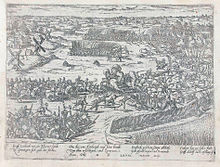Geusen


Geusen ( Dutch geuzen ) is the name given by the Dutch insurgents during the Eighty Years War (1568–1648).
Concept formation
The term Geusen is derived from the French word gueux " beggar ". According to contemporary portrayals, this designation has its origin in the handing over of a petition by the Dutch nobility in 1566 ( nobility compromise of Breda ) to Margaret of Parma, who was appointed governor by Spain . The petition called for explicitly ending the Inquisition and the persecution of Protestants her and the restoration of feudal liberties.
Count Charles de Berlaymont is said to have whispered in Margaret of Parma's ear, "You shouldn't be afraid of a bunch of beggars (gueux)". At that time this group consisted of two hundred mounted men who peacefully entered Brussels to hand over the petition. Their number should increase to as many as four hundred in the course of the negotiations.
The largely positive acceptance of the demands of the Dutch nobility by Margarete and their promise to forward the edict to King Philip of Spain put the rebels in a lofty mood, which was reflected in festivals with corresponding alcohol consumption. During such a festival, the name Geusen for the members allied in the struggle for independence was proposed by Heinrich von Brederode and adopted by the assembled. Here in attendance were William I of Orange and Count Lamoral, Count of Egmont and Ho (o) rn (s) . As a visible sign of the Confederation, the members wore gray beggar's robes while they stayed in Brussels. Out of solidarity and as an expression of passive resistance, many residents of Brussels also wore beggar's clothes for a while.
history
In 1566 there was a massacre of the Flemish "Geusen" by the troops of the Duke of Alba at the gates of the city of Wattrelos , which is still remembered by the "Fête des Berlouffes" every second weekend in September. The protest against Spanish rule reached its first climax in the same year with the iconoclasms of the Calvinists .
The Spanish King Philip then repealed the Inquisition, but in 1567 sent the Duke of Alba , Fernando Álvarez de Toledo, as the new governor with Spanish troops on a punitive expedition to the Netherlands. Alba also initially succeeded in suppressing the regional uprisings with the help of special courts, the so-called Blood Council of Brussels . More than 6,000 insurgents were executed in these actions, among them Count Lamoral von Egmont in 1568. However, with his ruthless and arbitrary actions, Alba provoked new uprisings that now spread across the country. With the Battle of Heiligerlee in 1568, the first military clash between the two sides, the Eighty Years' War began, in which Adolf von Nassau, the brother of William of Orange, was killed.
During this time, many noblemen and merchants who had fled Holland equipped privateers that hunted Spanish ships and shared the profits with the crews. The Wadden Islands Terschelling and Rottumeroog as well as English, French and East Frisian North Sea ports (especially Emden ) served as bases. Without appointment, however, these pirates were treated as outlawed pirates until William of Orange allied with them. He gave the skippers letters of war and appointed Wilhelm II von der Mark as admiral of the part of the resistance movement now called Wassergeusen . In the name of William of Orange, who was living in exile in London at the time , the Wassergeusen conquered the town of Brielle (Den Briel) at the mouth of the Meuse on April 1, 1572 , and other conquered towns soon followed. The Latin inscription in the coat of arms of Brielle still reminds us: 'Libertatis Primitiae' (The first liberated).
In 1572 the Geusen achieved their greatest success when they conquered the provinces of Zeeland and Holland . William I of Orange was elected as governor of the liberated provinces, which in effect gave him the leadership of the resistance against Spain.
In 1573 Alba was replaced by Don Luis de Zúñiga y Requesens . Even if the new governor was initially more successful than his predecessor, the rebels achieved another great victory: the "Bushgeusen" operating on land broke the dikes and flooded the country. This enabled the Wassergeusen to effectively support the liberation of the city of Leiden with their ships .
See also
literature
- Arnold von Anrath, Heinrich von Weseken; Klaus Bambauer, Hermann Kleinholz (ed.): Geusen and Spaniards on the Lower Rhine. The events of the years 1586–1632 according to the contemporary chronicles of the Wesel citizens Arnold von Anrath and Heinrich von Weseken. In. Studies and sources on the history of Wesel , Volume 14, Stadtarchiv, Wesel 1993, ISBN 3-924380-09-0
- Christoph Bimböse: Die Geusen - freedom struggle at sea and on land , in: Sebastian Buciak (ed.): Asymmetrical conflicts in the mirror of time , Berlin 2008, pp. 220-234
- Heinz Neukirchen: Geusen. The Netherlands' struggle for freedom. Transpress, VEB Publishing House for Transport, Berlin 1980 (with time table)
Web links
Individual evidence
